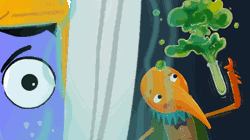- Interviews
- Aaron Conners (Englisch)
Interviews
Aaron Conners (Englisch)
Gesprächspartner: Ingmar Böke
Sprache: 
Vom:
18.06.2011
Adventure-Treff: Aaron, you joined the “Tex Murphy crew” quite some years after the character first appeared. Please tell us how and when you got involved with Access and tell us how you worked your way up to one of the driving forces behind Under A Killing Moon.
Aaron Conners: I did it the old-fashioned way...bribery! Actually, I was hired by an old friend from school who had been hired as a programmer at Access. He knew they were looking for a creative writer and gave me a call. One of my first jobs came from Chris Jones, who asked me to design a manual for his new game, Amazon. It turned out great and then Chris invited me to write up a story outline for the next game...which turned out to be Under a Killing Moon. Chris and I became friends right away and, after I showed him my mad game design skills, he made me “co-designer” in addition to doing the story and dialogue writing.
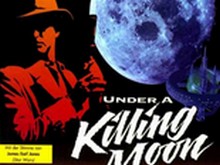
A-T: Under A Killing Moon was probably one of the most hyped and most talked about games on this planet before and around its release. Obviously, you guys did a lot of pioneer work with this game and it also meant quite a departure from the earlier work of Access. How would you describe the mood in the company at the time? Were you aware that you were about to create something that the gaming world hadn’t seen before and did you perhaps feel pressure because the expectations were so high at the time?
Aaron: It was a very exciting time. The technology – going to CD’s from floppy disks – made it seem like anything was possible. The FMV, black screen (later blue, then green screen) technology, etc., gave us the tools to make interactive movies, which was something Chris and I were very passionate about. There was no pressure at all because we were doing new things and, for awhile, everyone was totally jazzed about FMV and the crossover between games and movies.
A-T: Speaking of Under A Killing Moon: Please give us an overview of the development of the game and share some anecdotes.
Aaron: The biggest thing for me was how quickly the content exploded. At first, we were thinking “We’re on a CD now. We have more disc space than we could EVER use!” Of course, we ended up shipping on 4 CDs!
For me, it was a thrilling experience to write and design a game. Chris left it up to me to design the interactive conversations, the dialogue trees, ask abouts, etc., and I loved it. I added in the ability to “look” at tons of objects in the world. Poor Chris had no idea how many voiceovers he would have to do!
I have lots of great memories from that time. One of the best was getting James Earl Jones to do the voice of the “Great P.I. in the Sky”. After I wrote the part, we were all sitting around talking about who we should get to do the voice and someone suggested James Earl Jones. After we all stopped laughing, I said, “Well, it wouldn’t hurt to ask.” We contacted his agent and, it turned out, Mr. Jones’ son knew all about UKM being in development and was totally pumped about his dad doing a cameo in it. So we got this A-list talent to be in our game for scale (actors’ minimum) wages.
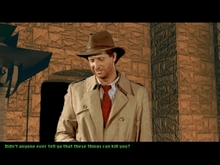
A-T: Now let’s move on to the game that many consider to be the best Tex Murphy game: The Pandora Directive. Again, please give us an overview of the development of the game and share some anecdotes.
Aaron: Making Pandora was even more fun than UKM. While it wasn’t so exhilarating, we knew what we were doing this time around, so it was more productive and efficient. The game design was better, the story was better – everything was better. Maybe the biggest difference was the quality of the acting and actors: Barry Corbin, John Agar, Tanya Roberts, and Kevin McCarthy (my personal favourite of all the actors we worked with), were amazing actors and fun people to hang out with. Plus it was nice to have Adrian Carr directing. Chris and I had done it on UKM and Adrian’s experience and talent made a huge difference.
As a writer/designer, I loved creating the narrative pathing, allowing players to guide Tex into different directions. I felt like it was one of the first and only games to give you that kind of experience.
Unfortunately, it was during this time that FMV games started to lose popularity...and it happened REALLY quickly. We kept seeing new, terrible FMV games coming out and getting horrible review scores. We were really afraid that they would end up dragging us down with them. Turns out, they did.

A-T: The development of the next game – Overseer – was quite turbulent. Please give us an idea of what happened between finishing The Pandora Directive and the decision of producing a vague remake of Mean Streets. In addition to that: Please give us a general overview of the development of Overseer and share some anecdotes.
Aaron: Overseer was a lot different from the previous two games. Our original plan was to start work on “Trance” and continue Tex’s storyline, but Intel approached us about making a “smaller” game to bundle with their new PC’s. They would pay us to develop the game, plus we could make a bunch of money on the back end. The only catch: we had to produce the game in less than six months. There was no way we could produce Trance in less than 18 months, so Chris decided that we should “remake” the original Mean Streets. I suggested that we do as a “flashback”, with Tex telling the story to Chelsee so we could continue to advance his current story a bit.
Many people think the story versions were the same (between Mean Streets and Overseer), but it’s really not. I had to do a ton of work to get it up to the standards of UKM and Pandora. I used as much of the old story as I could, but it was pretty weak. I had to change the plot around, rewrite ALL the dialogue, changed the names of all the characters with references to genitalia, etc. For me, it was as much work as the other games. In the end, the Intel deal didn’t go through as promised. We decided to add extra gameplay to beef up the game and release it on our own as a “full” Tex Murphy game, even though it really wasn’t. I think the game is very good, but it wasn’t at the same level as Pandora.

There was also some tension during development. We were really under the gun to get the game done quickly so it was an insane schedule. Creatively, there were disagreements between me, Chris, Adrian and a couple of the actors. I felt like we were starting to get too serious and some scenes were coming across as a bit “soap opera-y”. In particular, I remember Chris and the guy who played Robert Knott going off and rewriting a scene together – in a direction I thought was totally the wrong way to go. But that’s what ended up in the game. I still laugh every time I see Robert Knott string his crossbow and growl the line “I’m not going down without a fight” (one of the clichéd lines he and Chris added), just moments before getting killed with a single shot!
On a brighter note, I loved working with Michael York – the best pure actor I had the pleasure of working with – Henry Darrow, Rebecca Broussard, Richard Norton, etc. Our best cast overall.

A-T: If you look back at the series as a whole, which elements of which games are elements that you are especially proud of in retrospective?
Aaron: I think Under a Killing Moon is still pretty damn funny. Lots of great jokes and gags. And I’m proud of the conversation design which was innovative and fun – definitely a core feature of all the Tex games. In Pandora, I’m especially proud of how well we handled the different narrative paths – making them feel unique without needing to create three times the content. I also think the storyline was really good. For Overseer, I really like how the “story within a story” turned out; whenever Tex “died” in the game, it would cut back to Chelsee giving him a look and saying “OK...what really happened?”
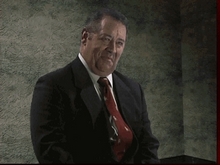
A-T: Which actors of the series impressed you most on set? Please feel free to share some anecdotes of working together with some of these people.
Aaron: As I mentioned, Michael York was the most impressive. He had this huge soliloquy that was several pages long, and he came in knowing the scene inside and out. We could ask him to start at any point and he would finish the scene flawlessly.
Barry Corbin wasn’t great at remembering his lines, but he NEVER broke character. He would just ad-lib and keep going – sometimes making the scene much better than I’d written it! Tanya Roberts couldn’t get through a whole scene without blowing a line or cracking up. Adrian Carr had to do a ton of editing of her scenes, but they turned out great. And we couldn’t be upset with her because she was so charming (and hot).
Kevin McCarthy was my favorite actor on a personal level. We spent quite a bit of time together and became friends. I was very sad when he passed away recently, but he was a wonderful man who lived a long, happy life.
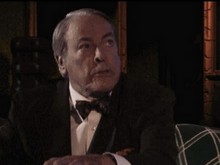
A-T: Speaking of actors: If you get the chance of doing another Tex Murphy FMV game one day, which actors would you personally love to work with in a future game?
Aaron: I don’t really have any specific actors in mind. The one actor we always wanted to work with was Leslie Nielsen – we wanted him to play Tex’s father – but he died a few years ago.
A-T: Your games and a few others (like Gabriel Knight II or Tender Loving Care) have proven that FMV had enormous potential - if it’s being handled by people who know what they are doing. On the other hand we’ve seen tons of really crappy games that did a lot of damage to the medium. Especially since you two are among the pioneers of FMV: How have you exprienced the demise of FMV and what reasons do you see for this development?
Aaron: You answered this question yourself: there were too many really crappy FMV games. There was nothing wrong with FMV per se, it just got associated with lousy games. To be fair though, it’s tricky to integrate FMV with computer-generated graphics...though it was harder back in the 90’s than it is today.
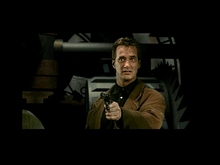
A-T: After the release of Overseer it was no secret that a new game was supposed to be done (which would have picked up where the cliffhanger of Overseer left us). Please tell our readers what happened with Access after Overseer was released and why the planned sequel didn’t happen back then.
Aaron: Pretty simple: Microsoft bought us and got to decide which projects we worked on. Microsoft was all about making money, and FMV games weren’t making money.
A-T: A long time passed from that point until the two of you came back with your own company (Big Finish Games) to do story-based games again. Please give us an idea of what happened to both of you inbetween. I know for example that there were quite some interesting projects that you’ve been working on that unfortunately never got released. So, please share the story of this long “gap”.
Aaron: Chris and I both worked for Microsoft – in different divisions – for a few years. The only thing we worked on together was a story and design for an unreleased game called “Guardian” – it was one of several planned games based on “A.I.”, the Steven Spielberg movie. Unfortunately, the movie wasn’t a good fit for the games and they were all cancelled eventually.
When Microsoft sold the studio to Take Two in 2004, I joined the Amped 3 project as the Story Director. In 2006, I went to Ubisoft and became the Creative Director for Shaun White Snowboarding and worked on that project until 2008.

A-T: Please talk about the motivation that made you found Big Finish games and share the story of your “story-based return”.
Aaron: Chris and I always stayed in close contact, plotting and scheming about how we could get together and make new games. After Ubisoft, I started my own contracting business and set up shop in an office at Chris’s company, TruGolf. In our spare time, we started looking into how we could make a game for very little money in hopes of making enough profit to eventually do a “full size” Tex Murphy game.
I know many of our fans have wondered why we didn’t just do a new Tex game, but I felt that it would need to be at a certain quality level or people would be tremendously disappointed...and we just didn’t have the resources to make that kind of game. That’s why we started looking into casual games as an option.
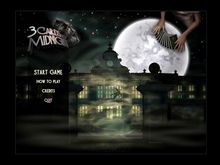
A-T: One of the main ideas behind the 3 Cards series seemed to be the intention to appeal to casual gamers and adventure gamers as well. We’ve seen quite a merger between these two markets in the last years and I’m wondering how you see this connection after the experience of releasing two 3 Cards games. Would you say that your intention payed off or does this whole casual/adventure thing sound a lot more promising in theory?
Aaron: At the time, it seemed like a great opportunity for us to bring better stories to the casual game market. As it turned out, that market is still not (and may never be) ready for complex stories and challenging gameplay. Most casual games are just pretty, mindless time-killers...and that’s what those players want. Some casual gamers LOVED the 3 Cards games and wondered why there weren’t more games like them available, but many other casual gamers HATED the games. It’s pretty hilarious if you read the user reviews on a site like Big Fish. People literally either love or hate the games – no one is in-between.
Personally, I’m done with casual games. It was a frustrating and disappointing experience. Not only was the audience not ready for our types of games, they expect a ton of quality for a low price so you can’t sell the games for very much money, and the distributors (like Big Fish and Gamehouse) take the lion’s share of the revenue, so you have to have a HUGE hit to be profitable.
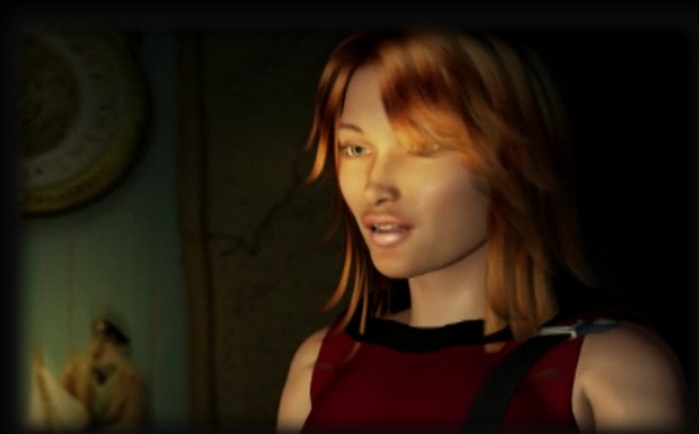
A-T: It’s no secret that you’ve been trying to bring back Tex Murphy for a long time. Of course I can’t let you go without asking you about the current status. So, please feel free to share anything there is to tell about the status of Tex and how chances are that we will see him return in one form or another.
Aaron: We have done a lot of design work and technical research for a new Tex game. We also created a new game engine that could work and not require a huge team to produce. Resources are still very limited, but...who knows?
A-T: Aside of Tex, please give us an idea of the future of Big Finish Games and tell us what we can expect from you in the near future.
Aaron: Chris has been overseeing a new project called “Thunder Island” (which I wasn’t involved with), which will be released soon on the Big Finish website. People can go there now and play a demo.
A-T: Again, thank you very much for doing this interview – much appreciated. All the best with your current and future projects!
Aaron Conners: I did it the old-fashioned way...bribery! Actually, I was hired by an old friend from school who had been hired as a programmer at Access. He knew they were looking for a creative writer and gave me a call. One of my first jobs came from Chris Jones, who asked me to design a manual for his new game, Amazon. It turned out great and then Chris invited me to write up a story outline for the next game...which turned out to be Under a Killing Moon. Chris and I became friends right away and, after I showed him my mad game design skills, he made me “co-designer” in addition to doing the story and dialogue writing.

A-T: Under A Killing Moon was probably one of the most hyped and most talked about games on this planet before and around its release. Obviously, you guys did a lot of pioneer work with this game and it also meant quite a departure from the earlier work of Access. How would you describe the mood in the company at the time? Were you aware that you were about to create something that the gaming world hadn’t seen before and did you perhaps feel pressure because the expectations were so high at the time?
Aaron: It was a very exciting time. The technology – going to CD’s from floppy disks – made it seem like anything was possible. The FMV, black screen (later blue, then green screen) technology, etc., gave us the tools to make interactive movies, which was something Chris and I were very passionate about. There was no pressure at all because we were doing new things and, for awhile, everyone was totally jazzed about FMV and the crossover between games and movies.
A-T: Speaking of Under A Killing Moon: Please give us an overview of the development of the game and share some anecdotes.
Aaron: The biggest thing for me was how quickly the content exploded. At first, we were thinking “We’re on a CD now. We have more disc space than we could EVER use!” Of course, we ended up shipping on 4 CDs!
For me, it was a thrilling experience to write and design a game. Chris left it up to me to design the interactive conversations, the dialogue trees, ask abouts, etc., and I loved it. I added in the ability to “look” at tons of objects in the world. Poor Chris had no idea how many voiceovers he would have to do!
I have lots of great memories from that time. One of the best was getting James Earl Jones to do the voice of the “Great P.I. in the Sky”. After I wrote the part, we were all sitting around talking about who we should get to do the voice and someone suggested James Earl Jones. After we all stopped laughing, I said, “Well, it wouldn’t hurt to ask.” We contacted his agent and, it turned out, Mr. Jones’ son knew all about UKM being in development and was totally pumped about his dad doing a cameo in it. So we got this A-list talent to be in our game for scale (actors’ minimum) wages.

A-T: Now let’s move on to the game that many consider to be the best Tex Murphy game: The Pandora Directive. Again, please give us an overview of the development of the game and share some anecdotes.
Aaron: Making Pandora was even more fun than UKM. While it wasn’t so exhilarating, we knew what we were doing this time around, so it was more productive and efficient. The game design was better, the story was better – everything was better. Maybe the biggest difference was the quality of the acting and actors: Barry Corbin, John Agar, Tanya Roberts, and Kevin McCarthy (my personal favourite of all the actors we worked with), were amazing actors and fun people to hang out with. Plus it was nice to have Adrian Carr directing. Chris and I had done it on UKM and Adrian’s experience and talent made a huge difference.
As a writer/designer, I loved creating the narrative pathing, allowing players to guide Tex into different directions. I felt like it was one of the first and only games to give you that kind of experience.
Unfortunately, it was during this time that FMV games started to lose popularity...and it happened REALLY quickly. We kept seeing new, terrible FMV games coming out and getting horrible review scores. We were really afraid that they would end up dragging us down with them. Turns out, they did.

A-T: The development of the next game – Overseer – was quite turbulent. Please give us an idea of what happened between finishing The Pandora Directive and the decision of producing a vague remake of Mean Streets. In addition to that: Please give us a general overview of the development of Overseer and share some anecdotes.
Aaron: Overseer was a lot different from the previous two games. Our original plan was to start work on “Trance” and continue Tex’s storyline, but Intel approached us about making a “smaller” game to bundle with their new PC’s. They would pay us to develop the game, plus we could make a bunch of money on the back end. The only catch: we had to produce the game in less than six months. There was no way we could produce Trance in less than 18 months, so Chris decided that we should “remake” the original Mean Streets. I suggested that we do as a “flashback”, with Tex telling the story to Chelsee so we could continue to advance his current story a bit.
Many people think the story versions were the same (between Mean Streets and Overseer), but it’s really not. I had to do a ton of work to get it up to the standards of UKM and Pandora. I used as much of the old story as I could, but it was pretty weak. I had to change the plot around, rewrite ALL the dialogue, changed the names of all the characters with references to genitalia, etc. For me, it was as much work as the other games. In the end, the Intel deal didn’t go through as promised. We decided to add extra gameplay to beef up the game and release it on our own as a “full” Tex Murphy game, even though it really wasn’t. I think the game is very good, but it wasn’t at the same level as Pandora.

There was also some tension during development. We were really under the gun to get the game done quickly so it was an insane schedule. Creatively, there were disagreements between me, Chris, Adrian and a couple of the actors. I felt like we were starting to get too serious and some scenes were coming across as a bit “soap opera-y”. In particular, I remember Chris and the guy who played Robert Knott going off and rewriting a scene together – in a direction I thought was totally the wrong way to go. But that’s what ended up in the game. I still laugh every time I see Robert Knott string his crossbow and growl the line “I’m not going down without a fight” (one of the clichéd lines he and Chris added), just moments before getting killed with a single shot!
On a brighter note, I loved working with Michael York – the best pure actor I had the pleasure of working with – Henry Darrow, Rebecca Broussard, Richard Norton, etc. Our best cast overall.

A-T: If you look back at the series as a whole, which elements of which games are elements that you are especially proud of in retrospective?
Aaron: I think Under a Killing Moon is still pretty damn funny. Lots of great jokes and gags. And I’m proud of the conversation design which was innovative and fun – definitely a core feature of all the Tex games. In Pandora, I’m especially proud of how well we handled the different narrative paths – making them feel unique without needing to create three times the content. I also think the storyline was really good. For Overseer, I really like how the “story within a story” turned out; whenever Tex “died” in the game, it would cut back to Chelsee giving him a look and saying “OK...what really happened?”

A-T: Which actors of the series impressed you most on set? Please feel free to share some anecdotes of working together with some of these people.
Aaron: As I mentioned, Michael York was the most impressive. He had this huge soliloquy that was several pages long, and he came in knowing the scene inside and out. We could ask him to start at any point and he would finish the scene flawlessly.
Barry Corbin wasn’t great at remembering his lines, but he NEVER broke character. He would just ad-lib and keep going – sometimes making the scene much better than I’d written it! Tanya Roberts couldn’t get through a whole scene without blowing a line or cracking up. Adrian Carr had to do a ton of editing of her scenes, but they turned out great. And we couldn’t be upset with her because she was so charming (and hot).
Kevin McCarthy was my favorite actor on a personal level. We spent quite a bit of time together and became friends. I was very sad when he passed away recently, but he was a wonderful man who lived a long, happy life.

A-T: Speaking of actors: If you get the chance of doing another Tex Murphy FMV game one day, which actors would you personally love to work with in a future game?
Aaron: I don’t really have any specific actors in mind. The one actor we always wanted to work with was Leslie Nielsen – we wanted him to play Tex’s father – but he died a few years ago.
A-T: Your games and a few others (like Gabriel Knight II or Tender Loving Care) have proven that FMV had enormous potential - if it’s being handled by people who know what they are doing. On the other hand we’ve seen tons of really crappy games that did a lot of damage to the medium. Especially since you two are among the pioneers of FMV: How have you exprienced the demise of FMV and what reasons do you see for this development?
Aaron: You answered this question yourself: there were too many really crappy FMV games. There was nothing wrong with FMV per se, it just got associated with lousy games. To be fair though, it’s tricky to integrate FMV with computer-generated graphics...though it was harder back in the 90’s than it is today.

A-T: After the release of Overseer it was no secret that a new game was supposed to be done (which would have picked up where the cliffhanger of Overseer left us). Please tell our readers what happened with Access after Overseer was released and why the planned sequel didn’t happen back then.
Aaron: Pretty simple: Microsoft bought us and got to decide which projects we worked on. Microsoft was all about making money, and FMV games weren’t making money.
A-T: A long time passed from that point until the two of you came back with your own company (Big Finish Games) to do story-based games again. Please give us an idea of what happened to both of you inbetween. I know for example that there were quite some interesting projects that you’ve been working on that unfortunately never got released. So, please share the story of this long “gap”.
Aaron: Chris and I both worked for Microsoft – in different divisions – for a few years. The only thing we worked on together was a story and design for an unreleased game called “Guardian” – it was one of several planned games based on “A.I.”, the Steven Spielberg movie. Unfortunately, the movie wasn’t a good fit for the games and they were all cancelled eventually.
When Microsoft sold the studio to Take Two in 2004, I joined the Amped 3 project as the Story Director. In 2006, I went to Ubisoft and became the Creative Director for Shaun White Snowboarding and worked on that project until 2008.

A-T: Please talk about the motivation that made you found Big Finish games and share the story of your “story-based return”.
Aaron: Chris and I always stayed in close contact, plotting and scheming about how we could get together and make new games. After Ubisoft, I started my own contracting business and set up shop in an office at Chris’s company, TruGolf. In our spare time, we started looking into how we could make a game for very little money in hopes of making enough profit to eventually do a “full size” Tex Murphy game.
I know many of our fans have wondered why we didn’t just do a new Tex game, but I felt that it would need to be at a certain quality level or people would be tremendously disappointed...and we just didn’t have the resources to make that kind of game. That’s why we started looking into casual games as an option.

A-T: One of the main ideas behind the 3 Cards series seemed to be the intention to appeal to casual gamers and adventure gamers as well. We’ve seen quite a merger between these two markets in the last years and I’m wondering how you see this connection after the experience of releasing two 3 Cards games. Would you say that your intention payed off or does this whole casual/adventure thing sound a lot more promising in theory?
Aaron: At the time, it seemed like a great opportunity for us to bring better stories to the casual game market. As it turned out, that market is still not (and may never be) ready for complex stories and challenging gameplay. Most casual games are just pretty, mindless time-killers...and that’s what those players want. Some casual gamers LOVED the 3 Cards games and wondered why there weren’t more games like them available, but many other casual gamers HATED the games. It’s pretty hilarious if you read the user reviews on a site like Big Fish. People literally either love or hate the games – no one is in-between.
Personally, I’m done with casual games. It was a frustrating and disappointing experience. Not only was the audience not ready for our types of games, they expect a ton of quality for a low price so you can’t sell the games for very much money, and the distributors (like Big Fish and Gamehouse) take the lion’s share of the revenue, so you have to have a HUGE hit to be profitable.

A-T: It’s no secret that you’ve been trying to bring back Tex Murphy for a long time. Of course I can’t let you go without asking you about the current status. So, please feel free to share anything there is to tell about the status of Tex and how chances are that we will see him return in one form or another.
Aaron: We have done a lot of design work and technical research for a new Tex game. We also created a new game engine that could work and not require a huge team to produce. Resources are still very limited, but...who knows?
A-T: Aside of Tex, please give us an idea of the future of Big Finish Games and tell us what we can expect from you in the near future.
Aaron: Chris has been overseeing a new project called “Thunder Island” (which I wasn’t involved with), which will be released soon on the Big Finish website. People can go there now and play a demo.
A-T: Again, thank you very much for doing this interview – much appreciated. All the best with your current and future projects!
Aktuelle Artikel
![]()
Unterstützen
![]()
Adventure-Treff-Verein
IBAN: DE38 8306 5408 0004 7212 25
BIC: GENODEF1SLR
Bitte beachtet, dass wir leider keine steuerrechtlich anrechenbare Spendenquittungen ausstellen können.
Mit jedem Einkauf bei unseren Partnern unterstützt ihr die Arbeit des Adventure-Treff e.V.


